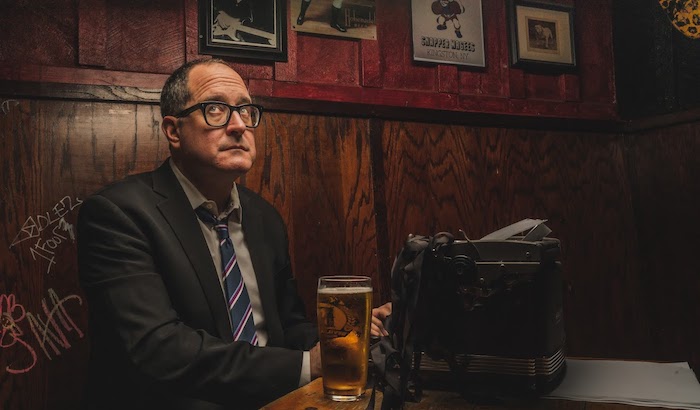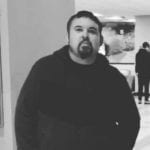
“I’ve kind of joked that it’s my Gone With The Wind record but in some ways it is more cinematic because of the scope and the feel that the strings bring in.”
Craig Finn has been switching things up lately.
The frontman of Brooklyn rockers The Hold Steady and former voice of the ’90s Minneapolis indie rock act Lifter Puller was looking to do something different with his solo material during the height of COVID-19 in 2020. This search for the peculiar after a ton of sonic exploration resulted in his fourth album, A Legacy Of Rentals, that was released via both The Hold Steady’s label Positive Jams and the Nashville-based entertainment company Thirty Tigers in May.
With his backing band, The Uptown Controllers, Finn will perform at the Crystal Ballroom at the Somerville Theatre on Oct. 11. Nashville singer-songwriter Katy Kirby will start off the night at 8pm.
We spoke ahead of the show about the process Finn undertook to make the new album, how it’s different than anything else he’s ever done, the influence of an old country song, starting a podcast, and his unique relationship with Boston.
How did you go through with the songwriting process during the making of A Legacy Of Rentals? Was it just you in a room surrounded by instruments to play around with? Or was it more concise than that?
My partner’s a nurse, she started working with COVID patients pretty much right away in April of 2020 and things were pretty heavy in New York at the time. I moved in with family about a half mile away from where I was at and to keep myself well-occupied I decided to start writing.
There was very little instrumentation, I just had a guitar with me, but that’s pretty normal. I tend to write the stories first with just some simple guitar chords and when we get to recording we flesh it out a little more. The thing I really noticed during that pandemic period was I was able to work really hard and I was able to get a lot done but I had a hard time figuring out what I really liked and what I didn’t, it all sort of hit me the same way.
I think that was mainly because I didn’t have the normal base to compare it to. It all seemed new and strange so I was unable to be critical of my own work in that period but I was able to get some advice from a few other artists I was talking to. They all said, Just work, you can figure all that stuff out later, so I did that. I just kept working and eventually I amassed this huge pile of songs, then I went to the producer Josh Kaufman to wade through them and I decided which ones were worth pursuing.
In the liner notes, you consider the album to be a bit different than anything you’ve ever done. Is that because of how COVID-19 affected the making of it, the various subject matters of the music or something else that makes it stick out for you?
I think sonically it’s a lot different because the three solo records that preceded this, especially the last one, were really heavy on horn arrangements. I made these three records with Josh and we were kind of like, Well, should we do another? and I figured that if we were going to do another one then we gotta make it different, that’s gotta be a priority. One thing we did is that we left a little more space on the songs and then we got Trey Pollard down in Richmond, Virginia to arrange this 14-piece string section which played on most of the record. I’d never really had that kind of lush arrangement with all those strings, I’ve kind of joked that it’s my Gone With The Wind record but in some ways it is more cinematic because of the scope and the feel that the strings bring in.
I definitely get the cinematic vibe while listening to it. When it came to crafting and capturing the sounds you wanted within the songs, did you have any particular influences coming into play or was it more of constantly wanting to do something different than your prior solo material like you said?
The one touchstone we had was “Wichita Lineman” which is a Glen Campbell song. That era of recording was this sort of ’60s pop songwriter kind of thing that used strings like that in some way and that song is probably the most classic example. That’s kind of what I was thinking, there was an elegance in that era that I wanted to try and reach for.
Back in May you started a podcast called That’s How I Remember It which examines the connection between memory and creativity. So far you’ve had guests such as Patterson Hood from Drive-By Truckers, Fred Armisen, Nick Lowe, John Darnielle from The Mountain Goats, Emily Haines from Metric, and Adam Duritz from Counting Crows among others. What inspired the creation of the podcast and how has the experience been for you doing it over the past few months?
It’s been great. A lot of the stories on the record deal with memory and particularly how we remember people that are gone or how we kind of carry on their names. This idea of memorial and tribute but also knowing the idea that memory is imperfect and history kind of gets moved around a little bit because we can only deal with our own human memories. I talked about that a lot in the songs and I thought it would be cool to keep having these conversations with other artists. It’s pretty easy to start a podcast so I started calling up my friends and I really loved it.
It sort of forces you to think about these things more and hear some new perspectives on memory and creativity in how they interact. It’s really a joy for me to do it, I’ve loved it. We’re taking a little break and ending season one as it will because I’m going on tour but we’ll start up after that with season two. It’s been a real pleasure and I’ve been blessed to have very thoughtful guests who’ve opened my eyes and mind to a lot of things too.
Even though you grew up in Minnesota and you’re currently living in Brooklyn, you were born in Boston. With this being said, do you view this upcoming show at the Crystal Ballroom to be somewhat of a homecoming for you? What are your thoughts and feelings when it comes to performing in the Boston area?
It is always kind of a homecoming and not only was I born at St. Elizabeth’s in Brighton, I lived in Norwell down in the South Shore when I was growing up until my parents moved to Minneapolis when I was in grade school. I came back to attend Boston College and I saw a lot of shows during that era that became very formative to me in the music scene there. It’s like a third hometown. I still have friends there and I’m always excited to come to Boston.
Craig Finn & The Uptown Controllers @ Crystal Ballroom
Rob Duguay is an arts & entertainment journalist based in Providence, RI who is originally from Shelton, CT. Outside of DigBoston, he also writes for The Providence Journal, The Connecticut Examiner, The Newport Daily News, Worcester Magazine, New Noise Magazine, Northern Transmissions and numerous other publications. While covering mostly music, he has also written about film, TV, comedy, theatre, visual art, food, drink, sports and cannabis.

